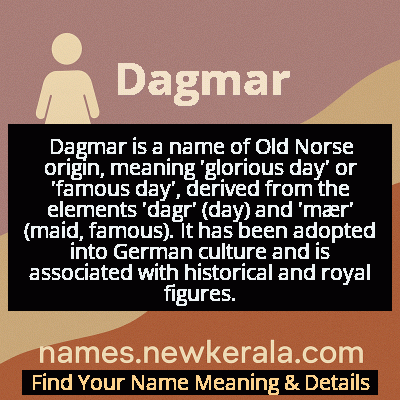Dagmar Name Meaning & Details
Origin, Popularity, Numerology Analysis & Name Meaning of Dagmar
Discover the origin, meaning, and cultural significance of the name DAGMAR. Delve into its historical roots and explore the lasting impact it has had on communities and traditions.
Name
Dagmar
Gender
Female
Origin
German
Lucky Number
8
Meaning of the Name - Dagmar
Dagmar is a name of Old Norse origin, meaning 'glorious day' or 'famous day', derived from the elements 'dagr' (day) and 'mær' (maid, famous). It has been adopted into German culture and is associated with historical and royal figures.
Dagmar - Complete Numerology Analysis
Your Numerology Number
Based on Pythagorean Numerology System
Ruling Planet
Saturn
Positive Nature
Ambitious, efficient, realistic, and authoritative.
Negative Traits
Materialistic, stressed, confrontational, and can be overly ambitious.
Lucky Colours
Dark blue, black.
Lucky Days
Saturday.
Lucky Stones
Blue sapphire, amethyst.
Harmony Numbers
2, 4, 6.
Best Suited Professions
Business leaders, managers, financial services, law enforcement.
What People Like About You
Leadership, determination, organizational skills.
Famous People Named Dagmar
Dagmar of Bohemia
Queen of Denmark
Beloved medieval queen later venerated as a saint for her piety and charity
Dagmar Lange
Author
Pioneering Swedish crime novelist writing as Maria Lang
Dagmar Midcap
Television personality
Prominent Canadian TV host and meteorologist
Dagmar Havlová
Actress and First Lady
Czech actress and former First Lady, cultural icon
Name Variations & International Equivalents
Click on blue names to explore their detailed meanings. Gray names with will be available soon.
Cultural & Historical Significance
The name experienced revivals during the Romantic period of the 19th century when medieval names became fashionable, and again in the early 20th century as part of Nordic cultural movements. In Germany and Scandinavian countries, Dagmar represents a connection to heritage and royal traditions while maintaining a accessible, feminine quality. The name's endurance across centuries demonstrates its deep cultural resonance, serving as a bridge between ancient Nordic traditions and modern European identity. Its continued use reflects the ongoing appreciation for names that carry historical weight while remaining elegant and distinctive.
Extended Personality Analysis
Individuals named Dagmar are typically associated with a unique blend of strength and grace that reflects their name's royal heritage and luminous meaning. They often possess natural leadership qualities combined with deep emotional intelligence, making them effective in both professional and personal spheres. Their 'glorious day' etymology frequently manifests as an optimistic outlook and ability to bring light to difficult situations, though they balance this sunshine with practical wisdom and responsibility.
Dagmars are known for their reliability and strong moral compass, often serving as the conscience of their social or professional groups. They tend to be traditional in their values yet progressive in their thinking, creating a balanced perspective that respects heritage while embracing innovation. Their intelligence is typically complemented by creativity, making them excellent problem-solvers who can see multiple solutions to challenges. In relationships, Dagmars are loyal and deeply committed, often forming strong bonds that last lifetimes. Their combination of dignity and approachability makes them both respected and beloved by those fortunate enough to know them closely.
Modern Usage & Popularity
In contemporary naming practices, Dagmar occupies an interesting space as a classic name that feels both timeless and distinctive. While its peak popularity occurred in the mid-20th century across Scandinavian countries and Germany, it has never become overly common, preserving its unique character. Recent years have seen a modest revival as part of the vintage name trend, particularly among parents seeking names with historical depth and cultural significance. In Germany, it maintains steady usage, while in Scandinavian countries it's considered a traditional choice that honors heritage. The name remains relatively rare in English-speaking countries, which adds to its appeal for parents seeking an internationally recognizable yet uncommon name. Current usage trends show Dagmar being chosen by parents who appreciate its strong feminine qualities, royal connections, and the beautiful imagery of 'glorious day' it evokes. Its accessibility in multiple languages makes it particularly appealing for families with international connections or multicultural backgrounds.
Symbolic & Spiritual Meanings
Symbolically, Dagmar represents a powerful convergence of light, feminine strength, and new beginnings. The 'day' component connects to universal symbols of illumination, clarity, and revelation—suggesting someone who brings understanding or enlightenment to complex situations. This luminous quality makes the name metaphorically associated with hope, guidance, and the dispelling of darkness or confusion. The 'glorious' or 'famous' aspect adds layers of achievement, honor, and lasting impact, positioning Dagmar as symbolic of earned respect and meaningful legacy.
In broader symbolic contexts, Dagmar embodies the archetype of the enlightened leader or wise woman who combines practical wisdom with compassionate insight. The name suggests balance between tradition and innovation, honoring roots while embracing progress. Its royal historical connections add symbolic weight representing natural authority and dignified presence. The complete meaning 'glorious day' makes it particularly potent as a symbol of renewal, fresh starts, and the triumph of light over darkness—making it meaningful for children born during significant transitions or as symbols of hope for their families.

